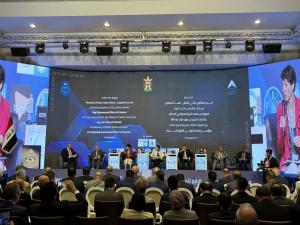Iraq grapples with severe water challenges exacerbated by climate change, population growth, upstream dam construction, and decades of conflict and instability. The Euphrates and Tigris rivers, vital lifelines for the region’s agriculture, ecosystems, and communities, face increasing threats from upstream water diversions, pollution, and unsustainable water management practices. Over the last 40 years, water flows from the Euphrates and Tigris rivers, which provide up to 98% of Iraq’s surface water, have decreased by 30-40%. Iraq’s overall water supply is expected to decrease by up to 60% by 2025 compared with 2015. These challenges underscore the urgent need for coordinated action and international cooperation to ensure the sustainable use and management of these transboundary water resources.
Against this backdrop, the Ministry of Water Resources of Iraq hosted the Fourth International Baghdad Water Conference (Baghdad, 27-29 April 2024), highlighting the importance of transboundary water cooperation in addressing pressing environmental and socio-economic issues. Under the slogan “Together we can”, the Fourth International Baghdad Water Conference gathered Ministers and Deputy Ministers from Egypt, Iran, State of Palestine, Syria, and Tunisia to address multifaceted water-related challenges in the region and beyond to exchange best practices in tackling water-related issues and the importance of transboundary water cooperation in addressing climate change impacts and fostering socio-economic development.
In 2023, Iraq became the first Party to the UN Water Convention from the Middle East and North Africa region, committing to enhanced transboundary water cooperation with its neighbors. In line with this, the conference served as an excellent opportunity to announce the National Water Dialogue, which “will contribute to the coordination between various sectors and will deepen and strengthen coordination to remove fragmented responsibilities”, said Dr. Sadeq Baqer Al-Jawad from the Prime Minister’s Advisory Commission in a session organized by the Ministry of Water Resources and the UN Water Task Force in Iraq, including the UNECE secretariat of the Water Convention. The Convention’s secretariat and a representative from Kazakhstan shared the over twenty-year experience gathered in Eastern Europe, the Caucasus, and Central Asia in the National Policy Dialogues on Integrated Water Resources Management under the Water Convention’s programme of work. This experience shows how effective an intersectoral multistakeholder platform can be in strengthening national governance, including the adoption and revision of water legislation, helping to test and introduce new practices and approaches, such as economic instruments, and attracting investments for driving water policy reforms.
In the high-level session Collectively Strengthening Transboundary Water Cooperation for Peace and security organized by UNECE, Switzerland, and Blue Peace Middle East, Deputy Ministers and other high-level participants from Iraq, Iran, Syria, the League of Arab States, and others discussed the benefits of transboundary cooperation in addressing current and emerging challenges and fostering regional integration. H.E. Mohammad Javanbakht, Deputy Minister of Energy of the Islamic Republic of Iran, emphasized the clear link between water and sand and dust storms and called for cooperation in mitigating this phenomenon, adding that in addition to cooperation between countries, measures can be taken at national scale . H.E. Hussein Abdulameer Baga Alzubeidi, Deputy Minister of Water Resources of the Republic of Iraq, urged all countries from the region to accede to the UN Water Convention and benefit from its framework and tools to advance transboundary water cooperation and enhance climate resilience.
Against this backdrop, the session The 1992 Water Convention: A Catalyst for Sustainable Transboundary Water Management and Climate Change Adaptation, organized by UNECE and ESCWA, showcased experiences from other parties, such as Finland and Hungary and shed light on the guidance developed under the Convention to adapt to the impacts of climate change in basins for enhanced resilience and regional integration. Mr Ghulam Mohammad Isczai, Deputy Special Representative, Resident Coordinator, and Humanitarian Coordinator of the United Nations to Iraq, emphasized the importance of transboundary water cooperation in driving regional integration: “Such efforts foster better resource management and enhance political stability across borders. The UN Water Convention provides a tested and effective framework to guide the efforts towards sustainable solutions”.


